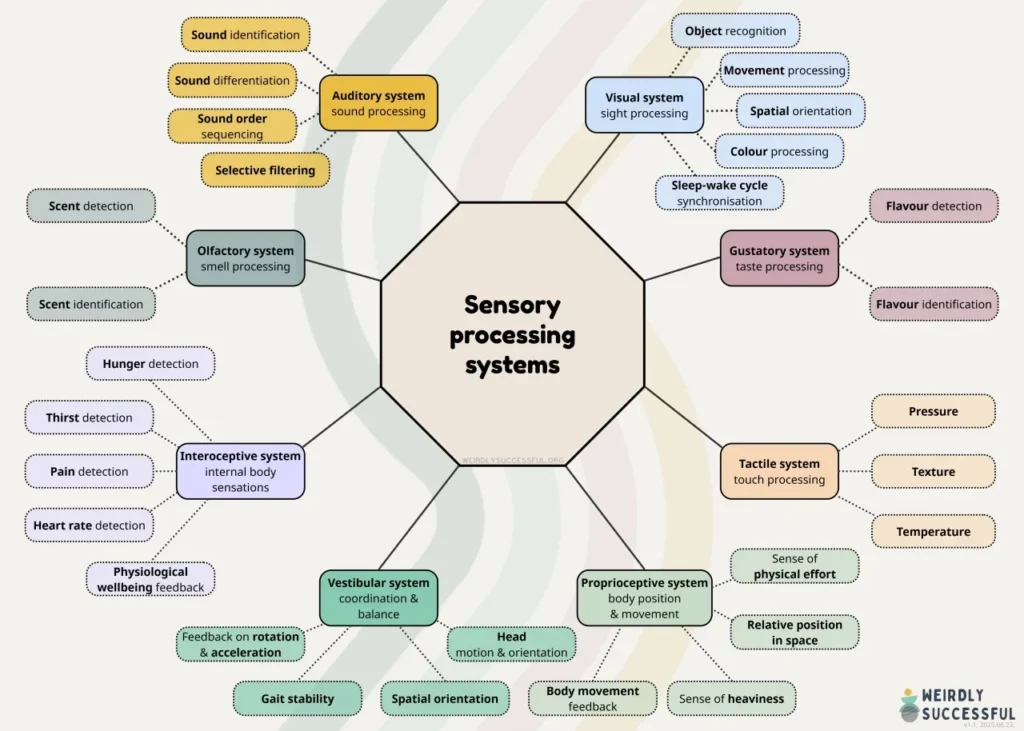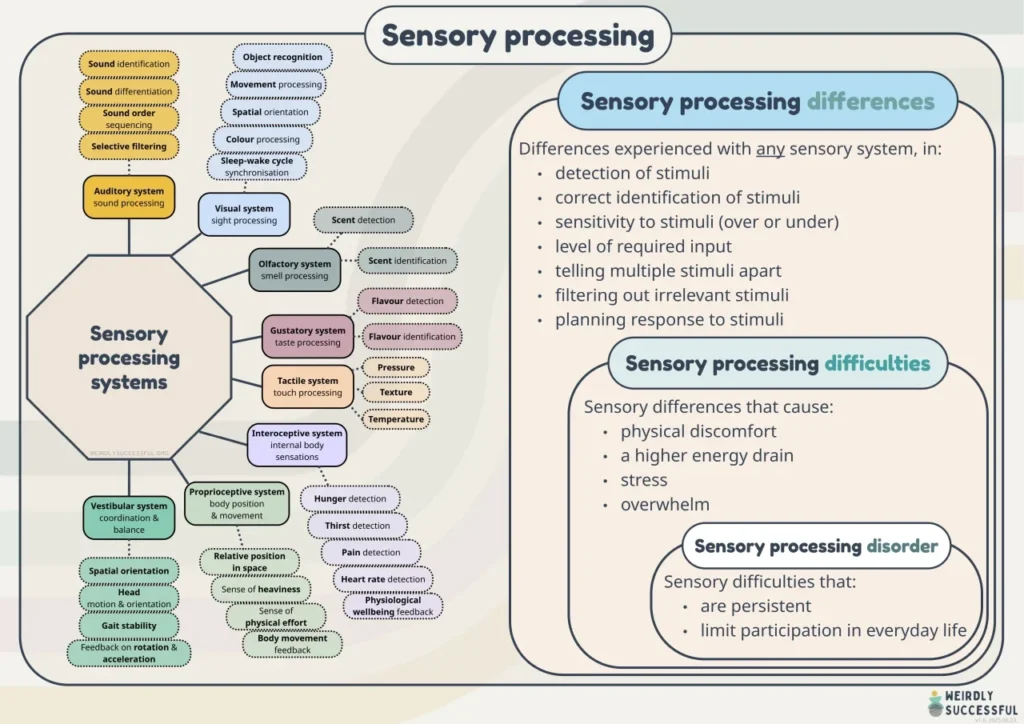Sensory Processing Disorder (SPD) is a potential grouping of sensory processing difficulties. It refers to a group of neurological differences that affects the way someone’s brain processes and responds to sensory information from their environment. In a neurodivergence context, SPD is often used as a shorthand to categorise the sensory issues that a neurodivergent person experiences.
Difficulties with sensory processing can manifest in various ways, such as hypersensitivity or hyposensitivity to stimuli like sound, touch, taste, smell, or movement. These sensory challenges can significantly impact a person’s daily life, causing discomfort, anxiety, and difficulties with attention, social interaction, and motor skills. Too many sensory stimuli can be overwhelming and it can lead to sensory overload.
Sensory Processing Disorder is not currently a standalone diagnosis recognised by the DSM or the ICD, the two most often used medical diagnostic manuals. That said, it’s clear that sensory processing differences are definitely a thing, however we decide to group them.

From the perspective of understanding one’s neurodivergent traits it makes a lot of logical sense to keep sensory traits in mind as their own category. Internally at Weirdly Successful we prefer to use the term ‘sensory processing differences‘ for the overall grouping of any and all neurodevelopmental differences relating to the senses. In turn, we use the term ‘sensory processing difficulties‘ to refer to the specific issues that people experience as a result of some of those differences.

References to Sensory Processing Disorder have been cropping up in recent years as general awareness around neurodivergent conditions has grown. This is understandable despite SPD not being an official diagnosis: while sensory processing issues are only currently recognised under diagnostic criteria for autism, it’s clear that a large number of neurodivergent people who aren’t diagnosed autistic still experience various sensory processing issues to an extent that it makes sense for them to point them out as their own separate group.
Get our Sensory Systems Guide as a PDF
Download now from The Library, our free resource hub for neurodivergent folks and those who support them.

Related terms
misophonia
Misophonia is a neurodivergent condition characterized by an intense emotional and physiological response to specific sounds. People with misophonia experience strong negative reactions, such as anger, anxiety, or disgust, when exposed to certain sounds. These sounds can vary from person to person but commonly include chewing, slurping, tapping, or repetitive noises.
ARFID
ARFID stands for Avoidant/Restrictive Food Intake Disorder. It is characterized by highly selective eating habits, often to the point of nutritional deficiency. Unlike anorexia or bulimia, ARFID is not driven by concerns about body image or weight. Instead, it’s typically related to sensory sensitivity, fear of adverse consequences (like choking or vomiting), or a lack of interest in eating.
auditory stimming
Auditory stimming is a natural self-regulatory behavior that involves making sounds with your voice, either through non-word vocalizations (vocal stimming) or speech-based expressions (verbal stimming). This form of stimming helps with emotional regulation, sensory processing, and achieving comfort and focus.
autistic burnout
Autistic burnout refers to a state of physical, mental, and emotional exhaustion experienced by autistic people. It is a result of prolonged exposure to overwhelming sensory, social, and cognitive demands, often in an environment that does not accommodate their needs.
context switching
Context switching refers to the cognitive process of shifting attention between different tasks or mental states. It involves disengaging from one task and engaging in another, requiring the brain to change its focus, rules, and objectives.
This process can be mentally taxing due to the cognitive load involved in stopping one task and starting another, shifting gears to focus on the new task, and getting accustomed to the new situation with all its stimuli. Frequent context switching and jumping from task to task can lead to a decrease in productivity and efficiency.
decompressing
Decompressing refers to engaging in activities or behaviours that allow a person to relax, unwind, and alleviate stress or sensory overload.
This term is particularly significant in the neurodivergent community as we often experience heightened sensitivity to environmental stimuli, leading to increased stress and anxiety levels.
Making sure to have time to decompress after especially taxing events is an essential part of self-care.
deep pressure
Deep pressure is a natural sensory need where firm, consistent pressure (like heavy blankets or tight hugs) helps tension melt away from your body. Many people naturally seek this through things like snug clothing or curling up under blankets – it’s your nervous system’s way of finding calm and comfort.
habituation
Habituation is a biological reaction mechanism where if a non-threatening stimuli keeps repeating, the response to it lowers over time. In neurodivergence, the brain’s reduced capacity for habituation means we can’t "tune out" unimportant stimuli, which leads to sensory difficulties and sensory overwhelm.
hypersensitivity
Hypersensitivity, also known as sensory over-responsivity, is a condition characterized by an extreme sensitivity or heightened response to sensory stimuli from the environment. Individuals with hypersensitivity may have a seemingly exaggerated reaction to various sensory inputs, such as sound, touch, taste, smell, or visual stimuli. These sensitivities can result in discomfort, distress, or even pain, …
hyposensitivity
Hyposensitivity, also known as sensory underresponsivity, is a condition characterized by a reduced sensitivity or diminished response to sensory stimuli from the environment.
Individuals with hyposensitivity may have difficulty with detecting or processing sensory inputs, such as sound, touch, taste, smell, or visual stimuli. They may require more intense or prolonged sensory stimulation to register and respond to the sensation.
restriction
Restriction means being prevented from moving freely or being confined against your will. It can include being held down, trapped, or having your movement controlled by others. This is particularly important for neurodivergent people, who have historically faced harmful practices where restriction was used to stop stimming, force compliance, or ‘manage’ sensory overload.
sensory avoiding
Sensory avoiding, also known as sensory under responsivity, refers to a pattern of behaviour where individuals actively try to avoid or minimize exposure to sensory stimuli. These individuals may have a heightened sensitivity to sensory input and may find certain sensations overwhelming or discomforting. As a result, they may engage in behaviours such as avoiding …
sensory overwhelm
A feeling of immense distress, a sensory overwhelm / autistic overwhelm is a strong reaction to stimuli caused by the compounded effects of stress, exhaustion, lack of safety, a sense of danger, unmet needs, too much information, noise, sights or sounds, smells or touch.
Sensory processing difficulties
Sensory processing difficulties are a group of traits associated with neurodivergence. They’re part of the wider group of sensory processing differences, meaning all the ways neurodivergent brains handle sensory information differently from neurotypical peers. Any of the brain’s 8 sensory processing systems can be affected by processing difficulties.
sensory-seeking
Sensory-seeking refers to a behavioural pattern or tendency in individuals where they actively seek out and engage in sensory experiences or stimuli. Individuals may have a heightened desire for sensory input and actively seek activities or environments that provide intense or stimulating sensations.
stimulus
A stimulus (plural: stimuli) refers to any physical or sensory input from the environment that elicits a response or reaction from someone. It can be any sensory information, such as sound, light, touch, taste, or smell, that triggers a biological or behavioural response. Stimuli can range from simple to complex and vary in intensity and …
transitions
Transitioning, in the context of neurodiversity, refers to the process of moving from one state, activity, or place to another. It involves a shift in attention, focus, and cognitive resources.
For neurodivergent individuals, it may require additional time, support, and strategies to manage effectively.
Transitioning can encompass a wide range of changes, from minor daily shifts like moving from one task to another, to major life changes such as transitioning from school to work or from living at home to independent living.
verbal shutdown
Verbal shutdown is a temporary inability to produce speech despite having intact language and thoughts – an involuntary neurological response to overwhelm. It’s when words exist in one’s mind but cannot be physically spoken due to sensory, emotional, or cognitive overload.
Casually and incorrectly it is sometimes also referred to as ‘going non-verbal’, but this term is not preferred by the non-speaking autistic community.



